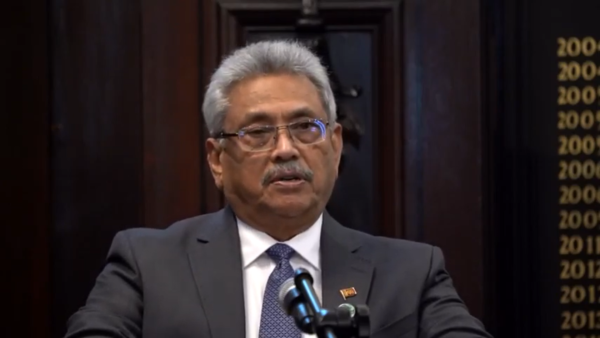
Ayubowan,
It gives me great pleasure to address you this evening and I am very happy to see such an illustrious turnout at this event.
As we are all aware, climate change is one of the greatest crises the world currently faces.
The leaders of nearly all countries are meeting over the next two days to discuss and hopefully commit to actions that will start leading us out of it.
In doing so, one of the key issues that Sri Lanka and some other countries will rightfully draw attention to is that of sustainable nitrogen management.
In October 2019, fourteen nations joined the Colombo Declaration on Sustainable Management.
This important declaration encourages nations to develop national roadmaps for sustainable nitrogen management, with a view to reducing nitrogen waste in half by 2030.
I thank the nations already associated with this declaration and encourage others to do the same.
Nitrogen is an abundant element that is essential to the sustenance of all living things.
However, reactive nitrogen generated by human activity and released into ecosystems worsens climate change.
Overuse of nitrogen, especially in fertilisers, has adverse impacts on soil, water, air, and human health.
For decades, chronic kidney disease has been a serious issue in Sri Lanka’s agricultural heartland.
The overuse of chemical fertilisers has contributed significantly to this problem.
It is in this context that my Government took firm steps to reduce imports of chemical fertilizer, and strongly encourage organic agriculture.
Although this action has been broadly appreciated, it has also met with some criticism and resistance.
In addition to chemical fertilizer lobby groups, this resistance has come from farmers who have grown accustomed to overusing fertilizer as an easy means of increasing yields.
This is particularly unfortunate considering Sri Lanka’s rich agricultural heritage.
Sri Lanka was known in historic times as the granary of the East.
This reputation was achieved in part due to the sophistication of our ancient hydraulic civilization.
It was also supported by the traditional wisdom and practices inherited by our farmers in the past, who understood the importance of respecting nature and worked hard to sustain it.
The challenge facing us now is to use modern scientific techniques and practices to enhance agricultural production without causing environmental degradation.
We require a new agricultural revolution that has sustainability at its core.
Sri Lanka’s philosophical heritage, enriched by the teachings of Lord Buddha, has always encouraged us to balance ecological concerns with human needs.
Humans must be in sync with nature, rather than work against it.
My Government’s policy frameworks emphasizes sustainability.
This is reflected in Sri Lanka’s ambitious updated Nationally Determined Contributions to the UNFCC Mechanism.
These include increasing the contribution of renewable energy sources to 70% of national needs by 2030, achieving carbon neutrality by 2050, and ensuring no more new coal power projects.
Sri Lanka is proud to be a co-lead of the Energy Compact for No New Coal Power.
We also play a leadership role in mangrove restoration and conservation, including through the Commonwealth Blue Charter.
Sri Lanka’s progressive agenda on the environment is despite the resource constraints it faces as a developing nation.
Sustaining such an agenda alongside development programmes is challenging for all developing nations, especially following the pandemic.
I therefore hope that developed countries will extend their fullest support to such nations through development assistance, technology transfers, skills development, investment and financing support.
There is also a significant role for businesses in this endeavour, and significant returns to be made in investments into sustainability.
Sri Lanka especially welcomes investments into renewable energy as well as organic agriculture and is prepared to support their success through incentives and appropriate policy interventions.
I therefore hope that greater cooperation in this regard will be forthcoming in the future.
All of us alive today are custodians of this planet on behalf of future generations.
We must all work together towards ensuring its health by contributing in whatever way we can.
If we all do this in a spirit of togetherness and good will, I am certain we will succeed in effecting positive change for our people and our planet.
Thank you.
............................................
The video can be viewed through the following link: https://youtu.be/

